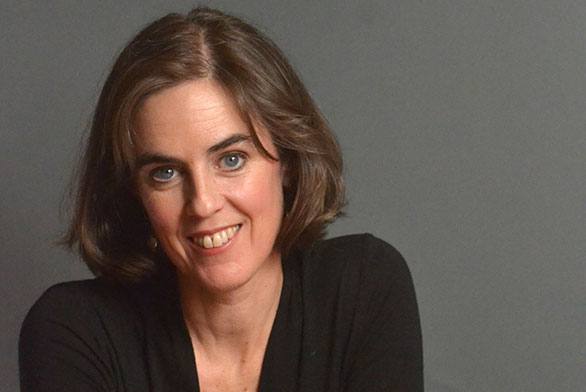Talking about Ideas
July 26, 2017 | Andrew Wice

As the Graduate Institute at St. John’s turns 50 years old, the college is featuring a series of stories to highlight the history, students—past and present—and other contributors who have made it what it is today.
An award-winning broadcast journalist, Mary-Charlotte Domandi (SFGI91) is known for interviews that dive deep. Her discursive approach has yielded sparkling exchanges with luminaries like Nobel physicist Murray Gell-Mann and Academy Award-winning actor Alan Arkin.
Most known for her Santa Fe-based show Radio Café, which ended last year after broadcasting live for 13 years on public radio, Domandi has earned a devoted, diverse fan base that has followed her into her latest endeavors. Over the course of its on-air life, Radio Café was voted Santa Fe’s favorite radio program six times in the Santa Fe Reporter’s readers poll.
Domandi’s interviewing technique engages guests in a conversation shorn of preconceptions or expectations. For this method, she credits the Graduate Institute at the Santa Fe campus of St. John’s College.
“St. John’s taught me to listen,” she says. “It taught me how to read carefully and listen carefully. It taught me how to listen respectfully to people whose ideas I didn’t necessarily agree with, or even respect. … It taught me that there are levels of depth in a text that you don’t get the first time around, or the second time around.”
As the child of college professors, veneration for the world of grown-up ideas was instilled early. She recalls straining her young mind at the dinner table, trying to comprehend the lively, wide-ranging discussions between her parents and their colleagues. Despite this upbringing, she describes herself as a failed academic: confining her curiosity to one narrow field proved impossible.
After graduating from Yale, Domandi explored the boundless diversions of northern New Mexico, and later stumbled across the St. John’s Graduate Institute. She completed her Master of Arts in Liberal Arts in 1991.
It was at the Graduate Institute that she acquired the tools to dig below the surface and inquire, “What’s the root of all this? What am I looking at? Where does it come from? I’m looking at the flowers on the tree. But what’s the trunk? The roots?”
Her route to broadcast journalism was equally winding. Twenty-five years ago, she heard a salsa program on NPR affiliate KUNM—which sparked a love for Latin music. She learned Spanish and traveled widely, amassing a towering music collection. She became a salsa DJ at prominent clubs in Santa Fe, which opened the door to hosting her own public radio show.
Domandi now has a website, Radiocafe.media, which is home to three distinct podcasts. Science Radio Café introduces pioneering scientists, such as Nina Lanza from the Mars Rover “Curiosity.” On the public policy front, Radio Activism offers episodes such as “Stephen Colbert’s Attorney on Why Campaign Finance Reform Matters to You.” And Down To Earth explores sustainable and regenerative agriculture; produced in partnership with the Quivira Coalition, the podcast promotes farming strategies which cooperate with the environment rather than compete against natural ecosystems.
With the success of programs such as NPR’s This American Life, modern media has emphasized storytelling as an end unto itself. Yet Domandi remains more fascinated by exploring issues into their depth, rather than reveling in the journey of their inspiration.
“The buzzword now is storytelling,” she says. “Storytelling is great, and I love storytelling. But what I’m interested in, where radio interviewing is concerned, is not so much storytelling, but ideas. And I feel like St. John’s really helped me to get to the heart of things in a text. What is the idea? What are we talking about? Not the story of how did we get there, but what is the essential idea at the heart of this reading?”
Domandi’s interview approach is rooted in Socratic methodology. Her goal is to ask questions that will elicit the pure content of her guest’s ideas.
“I want to bring out what is their strength, what is their beauty, what is their insight,” she says. “It’s only in retrospect that you think about the philosophy—oh, I’m using the St. John’s method. I never thought about that, at the time. But I wouldn’t have been as good an interviewer if I hadn’t gone to St. John’s. I owe way more to St. John’s than to Yale.”
Domandi counters the political fragmentation of our media, and the paucity of objective reporting, by continuing to produce high-quality programs with world-class guests, and to “have a conversation that stays friendly and exploratory and curious and intellectually honest and grounded. On the one hand, at as high a level as you possibly can, and on the other hand, not exclusionary because you’re not using jargon. If you do those things, you’re going to bring a lot of listeners in.”
Reflecting upon the future of Radiocafe.media, Domandi remains committed to her mission as a broadcast journalist.
“When you can go deeper and more thoughtfully into a topic than the ‘sort-of’ conversation of the daily punditry, and get to the root of things, it’s really valuable for citizens in a democracy … to not just go with the tide of that particular day, but what’s behind it.”
Learn more about the history of the Graduate Institute and upcoming festivities on the GI 50th Anniversary page.

